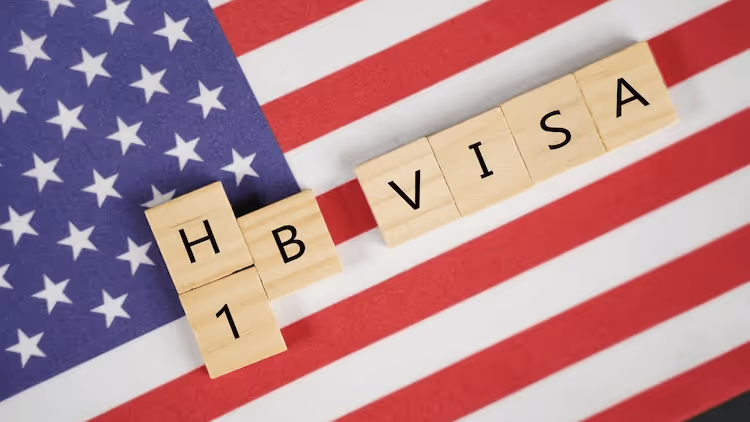.png)
.png)
Discover H1B visa new rules for 2025 including $100,000 fee increase, minimum salary changes, and wage requirements. Get expert guidance from Beyond Border.

September 19, 2025 will go down in immigration history. That's when President Trump signed the proclamation that turned H1B visa new rules upside down. A shocking $100,000 fee slammed employers like a freight train.
But wait, there's more.
The fee hike was just the beginning. Hidden in the fine print were other H1B visa rule changes that completely rewrote how this program works. Higher salary requirements. New lottery priorities. Updated wage calculations. The whole system got a massive overhaul.
Most people missed these details because they were too busy freaking out about the money. Big mistake. Understanding all the new rules for H1B visa 2025 could make or break your application strategy.
Let's start with the obvious disaster. H1B visa fees increase from roughly $3,000 to over $100,000 overnight. That's not a typo. We're talking about a 3,000% increase in one day.
H1B visa cost to employers now includes the base $100,000 fee plus all the regular charges. USCIS filing fees, attorney costs, premium processing if desired. The total package easily hits $105,000-$108,000 per petition.
Companies are having emergency board meetings. HR departments are scrambling to revise budgets. Some tech giants that used to file thousands of petitions are suddenly doing serious math about which employees are actually worth $100,000+ in fees.
The US visa fee increase 2025 specifically targets new H1B petitions filed after September 21. Current holders and already-filed cases remain unaffected. But anyone planning job changes or initial applications faces the full financial impact.
Concerned about the new fee structure? Get strategic guidance from Beyond Border on navigating 2025 H1B changes.
Here's what everyone missed while focusing on fees. H1B minimum salary requirements are getting a major overhaul too. The Department of Labor received orders to raise prevailing wage levels across all skill categories.
H1B minimum salary requirement changes affect both new petitions and renewals. Companies must demonstrate they're paying at or above updated prevailing wages for the specific job location and requirements.
Prevailing wage for H1B calculations use four levels. Level 1 covers entry-level positions. Level 2 handles qualified workers. Level 3 applies to experienced professionals. Level 4 targets fully competent experts.
The H1B wage requirements overhaul pushes all these levels higher. Level 1 positions might see 15-20% increases. Level 2 and above could jump even more dramatically. This means H1B salary level expectations are rising alongside the fee explosion.
H1B wage rules now explicitly prioritize higher-paid workers in lottery selection processes. USCIS will implement wage-based selection starting with the 2026 lottery season. Lower-paid positions get lower priority.
The H1B visa latest rules introduce fundamental changes to how winners get selected. Instead of pure random selection, the system will prioritize applications with higher salary offers.
This new H1B policy changes approach means companies offering Level 4 wages get first crack at available slots. Level 3 wages come next, then Level 2, and finally Level 1 positions if any slots remain.
New rules for H1B visa 2025 essentially create an auction system. Companies that pay more get better odds. Those trying to save money on salaries face much lower success rates.
The wage-based selection combines with the massive fee increase to fundamentally alter H1B economics. Only companies willing to pay premium wages AND premium fees will succeed consistently.
Need help understanding the new lottery priorities? Schedule a consultation with Beyond Border to optimize your chances.
H1B visa new rules hit different sectors in unique ways. Tech companies that traditionally filed thousands of applications are cutting back dramatically. Consulting firms that relied on lower wage levels are struggling with the new priorities.
Healthcare organizations might actually benefit. Doctors, researchers, and specialized medical professionals often qualify for higher wage levels naturally. The H1B minimum salary increases align well with medical profession compensation.
Financial services companies face mixed impacts. Senior analysts and quantitative researchers should do fine. Junior positions and back-office roles might become unviable under the new H1B wage requirements.
Startups got hit hardest. They typically can't afford $100,000+ fees for individual employees. They also struggle to offer Level 3 or Level 4 wages that improve lottery odds under US H1B visa new rules.

Smart companies are already adapting to H1B visa rule changes. Some are shifting hiring to their international offices. Others are exploring alternative visa categories like O1, L1, or TN visas.
H1B visa cost to employer calculations now include opportunity costs. Is this specific employee worth $100,000 in fees plus higher salary requirements? That's a tough question for many positions.
Some employers are bundling H1B applications strategically. Instead of filing for junior developers, they're focusing on senior architects and team leads who justify the full expense package.
The H1B visa fee increase is also driving more companies toward permanent residency sponsorship. EB2 and EB3 green card petitions start looking attractive when temporary visa costs reach six figures.
Looking for alternative strategies? Connect with Beyond Border's experts to explore options beyond the new H1B rules.
New rules for H1B visa 2025 create complex timing challenges. The fee increase took effect immediately in September. Wage-based lottery changes start with the 2026 season. Prevailing wage updates roll out gradually.
Companies with employees on expiring H1Bs face difficult decisions. Renew at the old fees (if possible) or transition to different visa categories? The H1B visa latest rules don't provide much transition relief.
Extension applications filed before September 21 avoid the $100,000 fee. But future renewals will face the full cost impact. This creates three-year budget planning nightmares for HR departments.
US visa fee increase 2026 might bring additional changes. The current fee structure could be just the beginning of broader immigration cost increases.
The H1B visa new rules face immediate court challenges. Several organizations filed lawsuits arguing the fee increase violates administrative law procedures. These cases could take months or years to resolve.
Meanwhile, companies must operate under the current rules regardless of pending litigation. H1B minimum salary compliance becomes essential even if legal challenges eventually succeed.
New H1B policy changes also create enforcement questions. How will USCIS verify salary levels? What happens if prevailing wages change after petition approval? The regulatory guidance remains incomplete.
Immigration attorneys are scrambling to understand all implications. Some provisions seem contradictory. Others lack clear implementation instructions.
Confused by the legal complexity? Get professional guidance from Beyond Border to navigate the new regulatory landscape.
The H1B visa rule changes require completely new decision frameworks. Employers need systematic approaches to evaluate which positions justify the massive cost increases.
H1B salary level analysis becomes the first filter. Positions that can't support Level 2 wages or higher face poor lottery odds under wage-based selection. Combined with $100,000 fees, many junior roles become economically unviable.
Business impact assessments gain importance. Can this specific employee generate enough value to justify $100,000+ in visa costs? The calculation includes salary, benefits, fees, and opportunity costs.
Risk tolerance matters too. Prevailing wage for H1B requirements could change again. Fee structures might increase further. Companies need contingency plans for multiple scenarios.
The US visa fee increase 2025 creates opportunities for other countries. Canada, Australia, and European nations are actively recruiting talent that America is pricing out.
H1B wage rules that prioritize expensive workers might backfire economically. Innovation often comes from diverse teams including junior developers, recent graduates, and entrepreneurs who can't command premium salaries immediately.
Global companies with multiple office locations gain flexibility. They can hire talented individuals in lower-cost jurisdictions while the US makes itself less competitive for international talent.
H1B visa new rules represent just the beginning of broader immigration policy changes. Additional fee increases seem likely. More restrictive eligibility criteria could follow. Wage requirements might continue rising.
Companies that adapt quickly to the new reality will maintain competitive advantages. Those that resist change or hope for policy reversals risk losing access to global talent pools.
The new rules for H1B visa 2025 fundamentally altered the risk-reward calculation for international hiring. Success requires strategic thinking, not just wishful hoping for better days.
Ready to adapt your strategy to the new reality? Start working with Beyond Border to build winning approaches under the changed rules.
Understanding these changes completely is essential for any company or individual dealing with H1B applications going forward.
Q. What are the new H1B visa rules for 2025?
H1B visa new rules include a $100,000 fee increase, higher salary requirements, and wage-based lottery selection starting 2026, fundamentally changing application economics.
Q. How much is the H1B visa fee increase?
H1B visa fee increase raised costs from $2,000-$5,000 to $100,000 per petition, plus regular filing fees, making total H1B visa cost to employers over $105,000.
Q. What is the new H1B minimum salary requirement?
H1B minimum salary requirements are rising through updated prevailing wage levels, with H1B wage requirements prioritizing higher-paid positions in lottery selection.
Q. How do the new H1B wage rules affect lottery selection?
H1B wage rules now prioritize applications with higher salary offers, with Level 4 wages getting first priority, followed by Level 3, 2, then 1.
Q. When do the new H1B policy changes take effect?
New H1B policy changes include immediate $100,000 fee (September 2025), updated prevailing wage for H1B calculations, and wage-based lottery starting 2026.